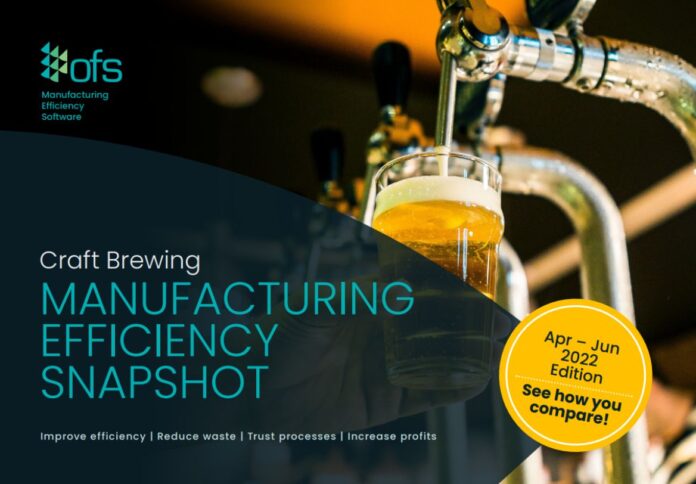
Media Release by OFS
- Research from OFS shows a 7.6% surge in craft beer production from April to June compared with the previous three months
- Unplanned downtime remains a key issue in the sector as brewers spend just 45% of available production time-making beer
- Craft brewers continue to show excellence in minimising waste, with a reduction of 28% compared to the previous three months
- Overall, the average craft brewer could be producing 4,836 more beers – an almost 75% increase – per hour with the same production schedule
Manufacturing performance software company, OFS, today announced findings from its quarterly Craft Brewers Benchmark Report, which provides insights into how data can be used to improve production efficiency in the craft brewing industry.
The report analysed the production of millions of litres of beer by primarily Australian, New Zealand and U.S. craft breweries between April and June this year to determine a view of ‘what good looks like’. It includes key performance benchmark data and explains why knowing overall equipment effectiveness (OEE) can make a significant impact on a brewer’s bottom line.
The data shows that while craft brewers increased production by 7.6 per cent compared with the previous three months, the industry average for actual production time while lines are available remains just 45 per cent.
“This is an industry that’s thriving while leaving so much potential on the table,” said OFS CEO James Magee. “That luxury can’t last forever – we need a mindset shift in how the industry collects and leverages data to improve productivity.”
Despite the challenges, craft brewers scored particularly well for waste efficiency. Just two per cent of beer produced didn’t end up in cans or bottles, marking an improvement of 28 per cent compared with the previous three months.
Other key statistics from the report include:
- On average, 6,517 units of craft beer were produced per hour, 74.2% behind the potential output of 11,353 per hour.
- It took brewers an average of 63 minutes to setup a job, an increase of four minutes compared with the previous three months.
- Unplanned downtime accounted for 25.46% of production time, in line with the previous three months.
- The industry earned an average OEE score – considered the gold standard for measuring productivity – of 44%, a slight increase from 43%.
Magee says visibility is key to further improving efficiency, as when craft brewers can see an opportunity in front of them, they don’t miss it.
“It’s telling that craft brewers manage product waste so well – they barely leave a drop behind,” he said. “Wasted time, however, is harder to view without the right tools in place, and it’s too easy to generalise and make assumptions about output, downtime, and changeovers when you’re relying on a busy crew updating an excel sheet or piece of paper.
“What we’re hoping to do with these industry snapshots is show the efficiency potential that’s there when craft brewers surface these insights. It isn’t rocket science, it is literally just an accurate real-time view of what’s happening on the line, and too few have it.”



















